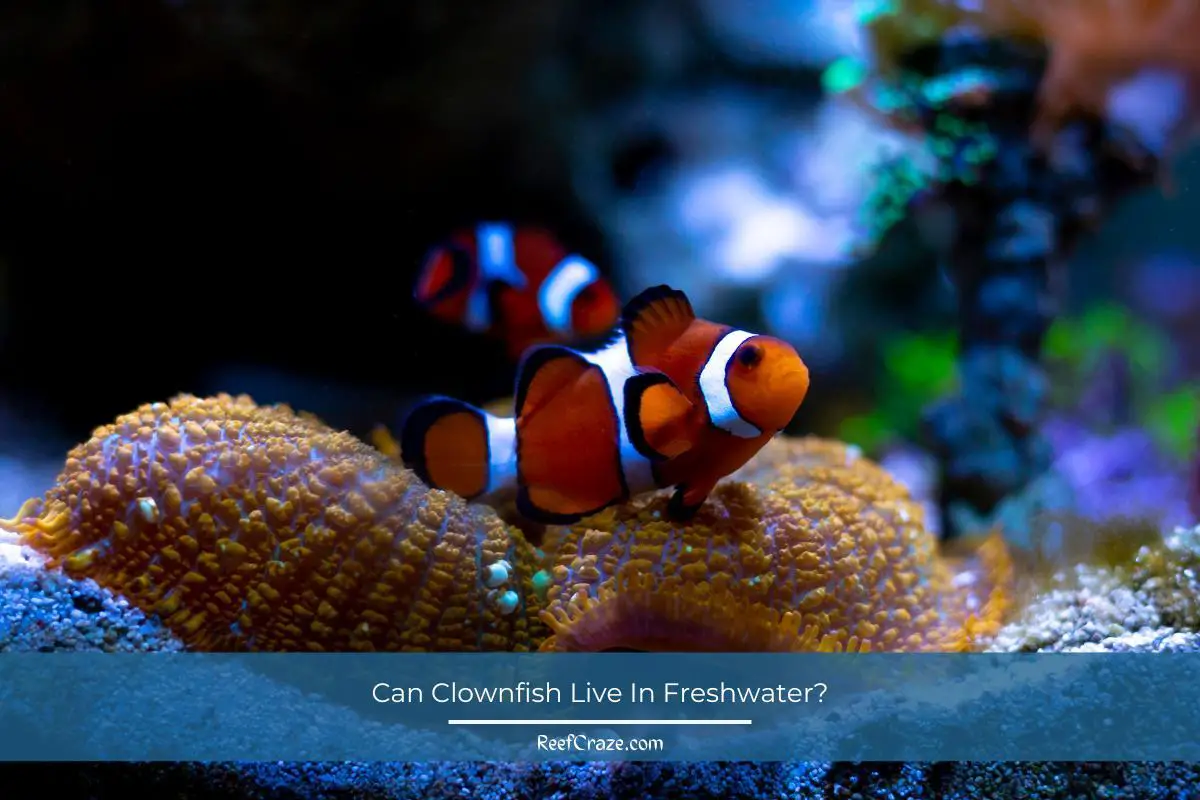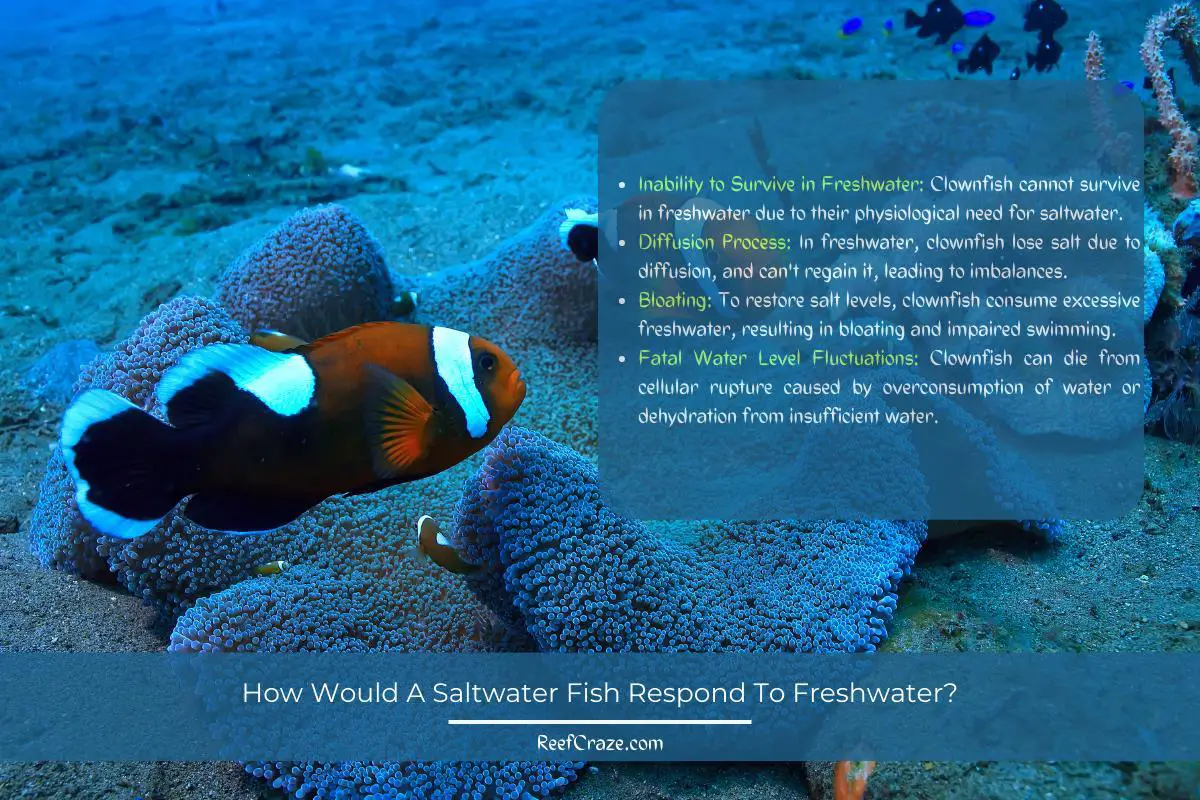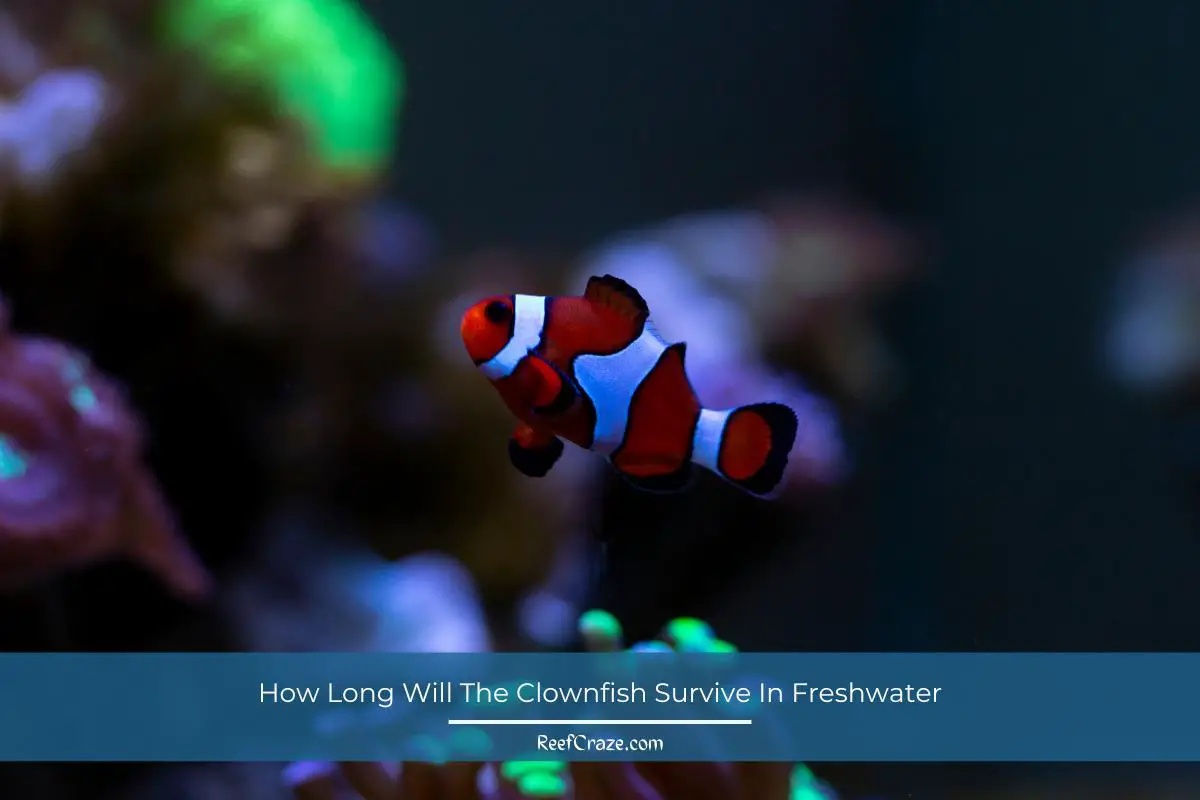If you are a fan of Finding Nemo, you are certainly familiar with clownfish, and I am sure their vibrant and quirky nature has snatched your heart. So if you ever decide to welcome a clownfish into your aquatic life, you must know about their living arrangements.
Clownfish are strictly and thoroughly saltwater fish. This marine fish is from the Indo-western Pacific ocean and mostly lives by the ocean reefs. That is why they can’t survive in the freshwater environment.
In this article, you will find all the information necessary to learn about the habitability of clownfish and whether you can bring them to your aquatic collection.

Why Can’t Clownfish Survive In Freshwater?
The characteristics and traits of saltwater clownfish are built so that it is impossible for them to survive in freshwater. Even though the requirement of seawater to survive doesn’t apply to the young clownfish since they need salt water when they mature. However, they still can not survive or adapt to freshwater for these reasons.
Osmosis
Saltwater fish like clownfish possess high concentrations of salt solution in their body. When a saltwater fish is dropped into freshwater, its body amasses too much water. Its cells swell up so much that they eventually burst, causing immediate death. In the scientific world, this process is called osmosis.
Freshwater contains a very limited amount of salt, especially sodium chloride. The body of Freshwater fish has a salt content of less than 1%, while saltwater fishes like clownfish have more than 3.5% of the salt content of their total body mass. When a fish shifts their habitation, the concentration of its salt-content of body disrupts tyrannically.
Oxygen Concentration
Another reason for the non-survival of saltwater fish in freshwater is the fluctuation of oxygen concentration. Deep in the sea, the oxygen levels are certainly lower. In fact, air saturation in seawater is 100% lower than in freshwater. Thus, saltwater creatures survive and thrive on a lower oxygen level where dissolved oxygen is 20% less than in freshwater.
Temperature Fluctuation
Temperature transference also plays a significant difference between freshwater and saltwater. Seawater fish generally is accustomed to 76°- 82° Fahrenheit. For the clownfish, the ideal temperature is 73° to 80° Fahrenheit. In freshwater, the temperature reads at 65° to 75° F in summer and 35° to 45° Fahrenheit in the winter.
Salinity Level
Clownfish survive in a very specific salinity status. Since they originate from the Pacific Ocean, they have adapted to the salinity between 1.02 to 1.024 PPT. Even a certain shifting on their original habitation will cause rapture of death for the clownfish. So, imagine what would happen if they were dropped suddenly in freshwater where the salinity level is less than 0.5 PPT.
How Would A Saltwater Fish Respond To Freshwater?
If you place clownfish in plain freshwater without arranging the necessary modifications, unfortunately, the fish will not survive for even a minute. Their regulatory systems are built in to survive in the seawater. It will be impossible for the gills, kidneys, intestines, and raspatory system to adjust.
If you must know what happens when you put clownfish in freshwater, you should consider their body mechanism of diffusion and atomic changes. Since clownfish have a higher atomic substance of salt in their body, salt water maintains the level while penetrating and leaving their body.

But in freshwater, due to the higher concentration of salt in the body and less concentration of salt in the freshwater, the diffusion process starts to initiate. The salt in the body of clownfish loses its higher concentrations and begins to accumulate in the water through the membrane. And since the salt level is lesser in freshwater, clownfish can hardly regain the salt they lost via diffusion.
From one point, they are losing salt and salinity level. And from another point, they are failing to restore the salt. In such a situation, they will consume more and more water to trace even the slightest hint of salt found in the freshwater. Gradually, the fish will be so bloated their body will be dropsy, making them harder to swim.
On the other hand, since fishes have permeable membranes, excessive fluctuations in water levels will kill them either way. If the body has less water than necessary, dehydration will kill them. If the body has too much water, a bloated belly will rapture them. Since clownfish will consume a ridiculous amount of water just to restore their salt level, the cells will be filled with water and explode to death.
How Long Will The Clownfish Survive In Freshwater?
If you place your clownfish into the freshwater, you can see death within 30 seconds to 1 minute at the top. The water parameters are grossly different from each other, and osmosis will not let the fish survive for more than 1 minute. But, if you add them to freshwater, a quick death isn’t even a serious problem.
If you use tap water as freshwater, you must know the existence of chlorine in the municipal lines. Chlorine is undoubtedly used to eliminate harmful bacteria susceptible to the human body. But for saltwater fishes like clownfish, the chlorine will work as a poison. That will burn their organs and cause the fish an inhumane death.

Aquarium Setup For Clownfish
Clownfish, if taken good care of, can survive 3 to 10 years or more. Let’s see how you can build a tank suitable for your clownfish.
| Parameters | Ranges |
| Size | > 20 gallons |
| Salinity level | 1.02 to 1.024 PPT |
| Dissolved Oxygen level | 5-6 PPT |
| Temperature | 73° F to 82° F |
| pH level | 7.8 to 8.4 |
| Specific gravity | 1.021 to 1.026 |
Size Of The Tank
For a natural, aquatic ambiance, take a tank of at least the size of 20 gallons. The more fish you want to add, the more gallons you need to include. For example, if you want to add 2 clownfish, take a 30 gallon tank. If you decide to keep an anemone, too, the tank size should be 50 gallons minimum.
Salinity Level
The salinity level should be from 1.02 to 1.024 PPT. Always keep the salinity level in check. In addition, to create a saline ambiance, you also need to ensure proper filtration. Because the ammonia and nitrate produced inside the tank react fast with the salty water and may put the fish in danger.
Dissolved Oxygen Level
For clownfish, the proper oxygen level is crucial for them to survive and thrive. The dissolved oxygen level should be 5-6 PPT. You must fetch a meter to always keep the level in check. Because if the level drops to 3-4 PPT, you will notice visible stress execution by your fish. And if the number drops lower than 2, your fish is definitely in imminent danger.
Temperature
The ideal temperature for the clownfish is 73° F to 82° F. Always keep the temperature at the same level. Do not keep the tank in contrast with direct sunlight. It will dilapidate the temperature settings. If you must keep under the sunlight, drop the temperature 2-3 degrees lower to adjust.
Ph Level
The pH set up for the saltwater aquarium should be 7.8 to 8.4. As you have noticed, the level is slightly alkaline. Without alkalinity, corals and invertebrates will fail to create calcium-oriented structures inside the tank. The alkalinity should be 142-215 PPT to ensure coral calcification as well as a healthy skeleton.
Specific Gravity
The proper range of specific gravity for the saltwater tank is 1.021 to 1.026. Specific gravity maintains the dissolved salinity in the water. The water density is directly related to the proper salinity level or dissolved sea level. Specific gravity will indicate the proper maintenance of salinity in the saltwater aquarium.
What Kind Of Salt To Use?
There are numerous options for you to choose from. You need to choose the best option for your aquarium, considering the type of coral you have in your tank. However, whatever salt you choose, always ensure those salts are rich in magnesium, calcium, and alkalinity. Marine salt is an ideal kind of salt for the saltwater aquarium.
You can find lots of marine salt for your aquarium. Before you make the big purchase ensure the parameters level is synchronized with your tank. Also, always check to ensure that your salt mix doesn’t have an anti-caking agent, which has a tendency to turn vats brown gradually and turn the saltwater environment holding buckets.
Final Words
Freshwater and clownfish can never be best friends, and it would be foolish of you if you wanted to befriend them. Clownfish are biologically made for saltwater, and freshwater will put your clownfish to deep sleep faster than any poison. So, never place your clownfish in any sort of freshwater, ever.
